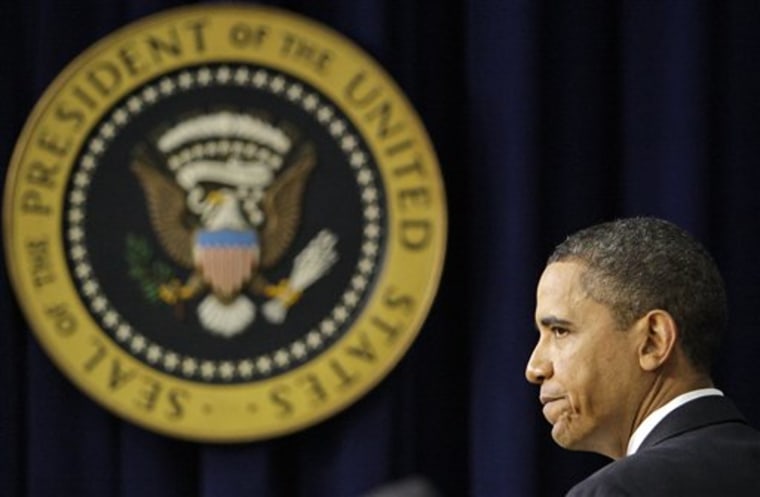It's not just about bad banking.
President Barack Obama's biting criticism of big banks frames the problem as a struggle between jobless, suffering Americans and banks making big profits and paying "obscene" bonuses.
It's populism straight out of Frank Capra's "It's a Wonderful Life," and it aims to score political points in the midst of a weak economic recovery that is fueling public doubts about the president's own economic policies.
Obama proposed a 10-year, $90 billion tax on the largest financial institutions on Thursday, saying he wanted the money to back any shortfall in the $700 billion Troubled Asset Relief Program that the government launched to bail out foundering firms at the height of the financial crisis.
Obama's haves-versus-have-nots message was as explicit as any political message he has delivered as president.
"If these companies are in good enough shape to afford massive bonuses, they are surely in good enough shape to afford paying back every penny to taxpayers," he declared. "We want our money back."
To drive the point home, he also said:
"My determination to achieve this goal is only heightened when I see reports of massive profits and obscene bonuses at some of the very firms who owe their continued existence to the American people, folks who have not been made whole and who continue to face real hardship in this recession."
Whether his plan stands a chance in Congress remains to be seen. House leaders and rank-and-file liberals cheered the bank tax. In the Senate, Banking Committee Chairman Chris Dodd, D-Conn., also welcomed the plan. But Democratic Sen. Max Baucus of Montana, the chairman of the Senate tax-writing Finance Committee, was more cautious.
"I remain committed to working with the president, and my colleagues across the aisle, to make sure this proposal is right for America and for American taxpayers," he said in a statement.
Critics of the plan assailed it as bad economic policy that would force banks to simply pass on the costs of the tax to consumers, drying up lending even further and hurting cash-strapped small businesses.
What's more, the tax would also apply to institutions that either chose not to take bailout money or have already paid it back, with interest. And General Motors Co. and Chrysler Group LLC, two automakers that received $66 billion in TARP loans, would not be subject to the tax even though they are not expected to make the government whole.
GOP Rep. Scott Garrett of New Jersey, a member of the House Financial Services Committee, called the plan a "job-killing initiative that will further cripple the economy by increasing fees passed on to consumers and small businesses, while reducing consumer credit."
But the White House made it clear the administration would make things quite uncomfortable for politicians who object.
"They can explain that to their constituents and to the American people," White House spokesman Robert Gibbs said. "If you want to be on the side of big banks, then you're certainly — this is a great country — you're free to do so."
To claims that the costs will simply be borne by consumers, Gene Sperling, an adviser to Treasury Secretary Timothy Geithner, countered: "It just strains credulity to suggest that banks who are now announcing bonus pools ranging from $10 billion to perhaps even $30 billion can find no other way to meet their responsibility to pay back the American taxpayer other than to suggest that they would pull back on lending."
So, prospects of actual passage aside, the real impact of Obama's vocal stance is that it draws unfavorable attention to Wall Street just as the public learns that the bailed-out financial institutions are now on such sound footing that they are declaring profits and paying bonuses.
For bankers, bonus season could not have come at a more difficult time. Unemployment remains stubbornly at 10 percent, the Senate is writing new banking regulations and a special commission is examining the causes of the financial meltdown.
For Democratic lawmakers who find themselves uncomfortably defending their past votes in favor of the huge rescue fund, Obama's finger wagging also provides them with a needed narrative line.
"It was tough to make the TARP vote and the bankers are making it even tougher," Rep. Steve Cohen, D-Tenn., said referring to executive bonuses. "They are pigs at the trough."
Obama's proposal drew some praise from international quarters. Dominique Strauss-Kahn, managing director of the International Monetary Fund, said the United States has sent "a very good signal" to the world.
"I really celebrate this proposal by the U.S. government because it shows the political momentum to move in this direction is still there," he said.
But for now, Obama's message was strictly domestic.
